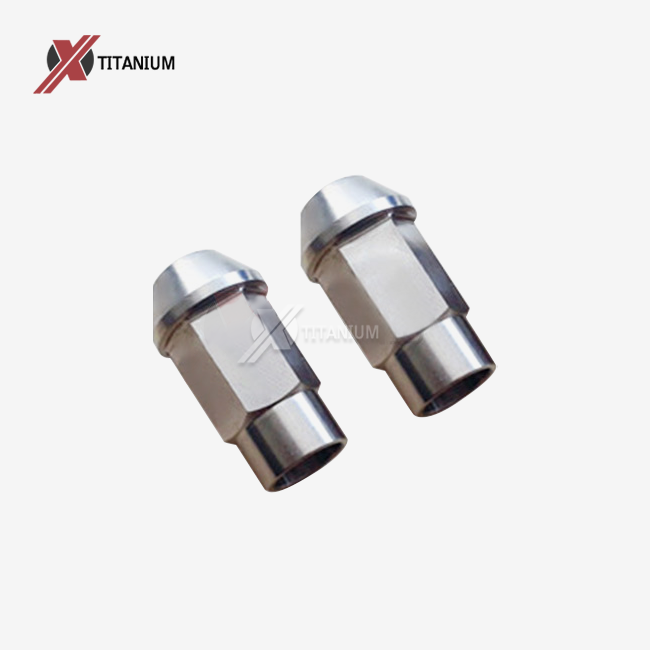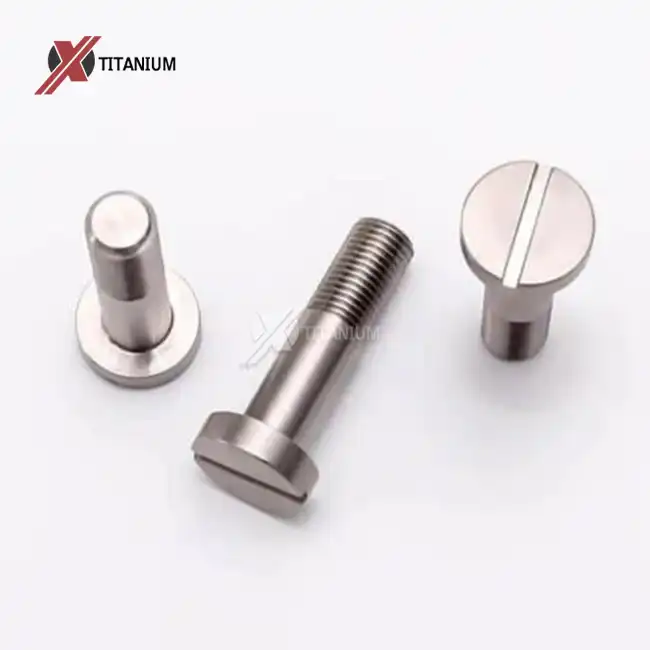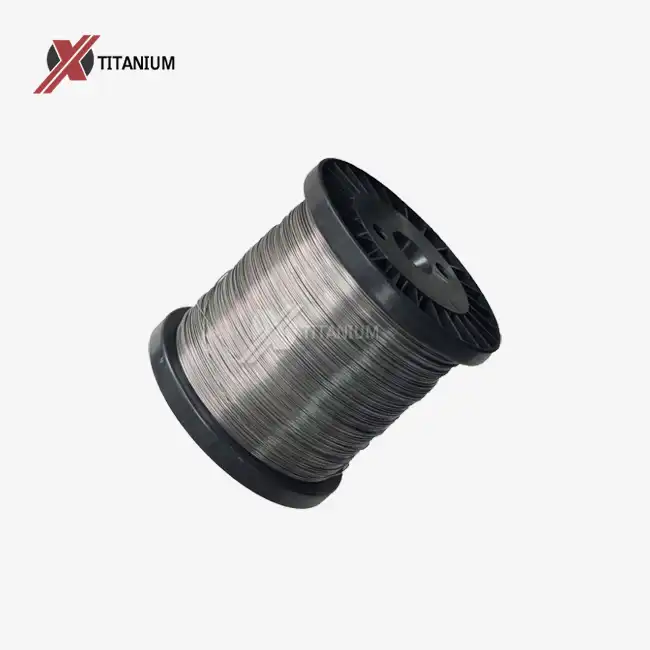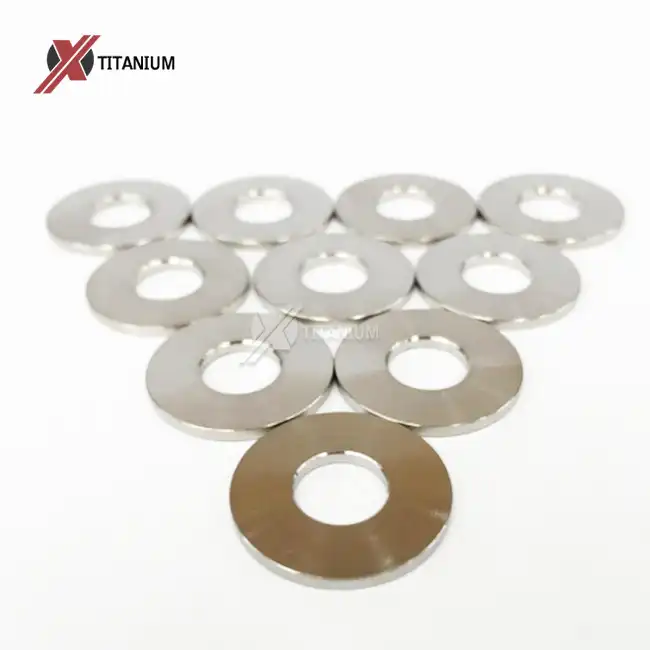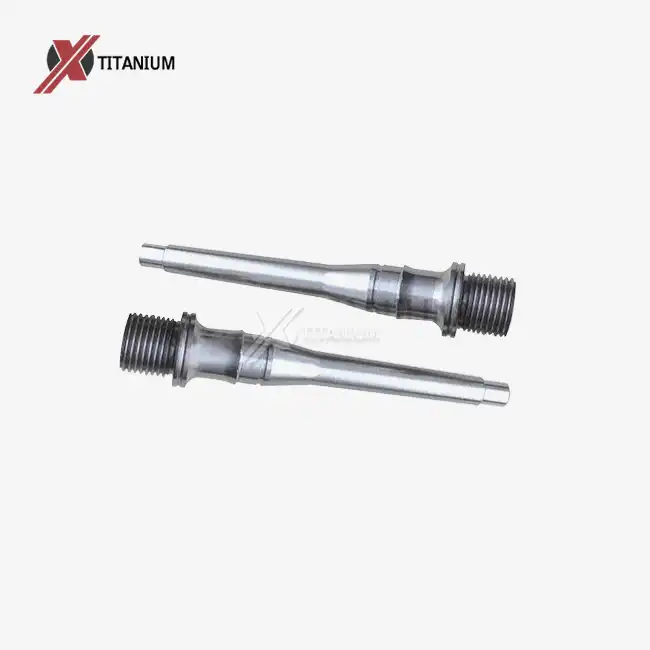The Advantages of Titanium Lug Nuts in Racing
Titanium lug nuts have become increasingly popular in high-performance racing due to their unique properties. These fasteners offer a range of benefits that contribute to overall vehicle performance and safety on the track.
Unparalleled Strength-to-Weight Ratio
One of the most significant advantages of titanium lug nuts is their exceptional strength-to-weight ratio. Titanium alloys used in these fasteners, such as Grade 5 (Ti6Al4V), provide a tensile strength of approximately 130,000 psi while being 45% lighter than their steel counterparts. This remarkable combination allows race teams to reduce unsprung weight without compromising the structural integrity of the wheel assembly.
The reduction in weight translates to improved acceleration, braking, and handling characteristics. Every gram saved in rotating mass can have a substantial impact on a race car's performance, particularly in high-speed cornering and rapid direction changes. By utilizing titanium lug nuts, teams can fine-tune their vehicles for optimal performance on various track configurations.
Corrosion Resistance and Durability
Racing environments often expose vehicles to harsh conditions, including extreme temperatures, moisture, and corrosive substances. Titanium lug nuts excel in these challenging scenarios due to their inherent corrosion resistance. Unlike steel fasteners, which may rust or deteriorate over time, titanium lug nuts maintain their structural integrity and appearance even after prolonged exposure to adverse elements.
This durability extends the lifespan of the lug nuts, reducing the frequency of replacements and minimizing the risk of failure during critical race moments. The reliability of titanium lug nuts provides peace of mind to racing teams, allowing them to focus on other aspects of vehicle performance and strategy.
Heat Dissipation and Thermal Stability
High-performance racing puts immense stress on all components of a vehicle, including the wheel assembly. Titanium lug nuts offer superior heat dissipation properties compared to traditional materials. This characteristic helps maintain consistent performance during extended racing sessions, where brake heat can transfer to the wheels and lug nuts.
The thermal stability of titanium ensures that the lug nuts maintain their strength and dimensional accuracy even under extreme temperature fluctuations. This property is crucial for maintaining proper torque and preventing loosening during races, which could lead to catastrophic wheel failures.
Design Innovations in Titanium Lug Nuts
As the demand for titanium lug nuts in high-performance racing has grown, manufacturers have introduced various design innovations to further enhance their functionality and performance.
Precision Engineering and Manufacturing
Modern titanium lug nuts are produced using advanced CNC machining techniques, ensuring exceptional precision and consistency. Manufacturers like Baoji Chuanglian New Metal Material Co., Ltd. utilize state-of-the-art equipment to create lug nuts with tight tolerances and superior surface finishes.
This level of precision engineering contributes to improved fitment, reduced vibration, and enhanced overall performance. Racing teams can rely on these meticulously crafted components to maintain optimal wheel alignment and balance throughout grueling races.
Customized Thread Designs
To meet the diverse requirements of different racing series and vehicle specifications, titanium lug nut manufacturers offer a wide range of thread sizes and patterns. Common options include M12x1.25mm, M12x1.5mm, M14x1.5mm, and 1/2"-20, among others. This versatility allows teams to select the perfect lug nut for their specific application, ensuring compatibility with various wheel designs and hub configurations.
Some manufacturers have also developed proprietary thread designs that offer enhanced engagement and load distribution. These innovations can improve the overall strength of the wheel assembly and provide additional safety margins in high-stress racing conditions.
Seat and Drive Configurations
Titanium lug nuts are available in various seat configurations to accommodate different wheel designs and load requirements. The most common options include 60-degree cone seats and ball seats. These specialized designs ensure optimal contact between the lug nut and the wheel, distributing forces evenly and minimizing the risk of loosening or failure.
Additionally, manufacturers have developed innovative drive configurations, such as hex drives and spline drives, to facilitate quick and efficient wheel changes during pit stops. These designs allow pit crews to remove and install lug nuts rapidly, shaving precious seconds off pit times and potentially improving race outcomes.
The Future of Titanium Lug Nuts in Motorsports
As the racing industry continues to evolve, titanium lug nuts are poised to play an increasingly important role in high-performance applications. The ongoing development of these critical components promises to bring new advancements and benefits to the world of motorsports.
Advanced Coatings and Surface Treatments
Inquire about into progressed coatings and surface medicines for titanium lug nuts is opening up unused conceivable outcomes for upgraded execution. Producers are investigating alternatives such as diamond-like carbon (DLC) coatings, which can advance diminish grinding and move forward wear resistance. These cutting-edge medicines may lead to indeed longer-lasting carry nuts with progressed torque maintenance properties.
Additionally, anodizing procedures are being refined to offer a more extensive extend of colors and wraps up. This permits dashing groups to color-code their haul nuts for speedy recognizable proof amid pit stops or to coordinate their vehicle's stylish plan. Prevalent color alternatives incorporate gold, blue, dark, purple, green, and indeed multi-colored "rainbow" wraps up.
Integration with Smart Technologies
The future of racing may see titanium lug nuts integrated with smart technologies to provide real-time data on wheel assembly performance. Embedded sensors could monitor torque levels, temperature, and vibration, alerting teams to potential issues before they become critical. This integration of titanium lug nuts with IoT (Internet of Things) capabilities could revolutionize race strategy and vehicle maintenance practices.
Sustainability and Recycling Initiatives
As the automotive industry moves towards more sustainable practices, the recyclability of titanium lug nuts is becoming an important consideration. Titanium's ability to be recycled without loss of quality makes it an environmentally friendly choice for racing teams looking to reduce their carbon footprint. Future developments may focus on creating closed-loop recycling systems for used titanium lug nuts, further enhancing their eco-friendly credentials.
Conclusion
In conclusion, the rise of titanium lug nuts in high-performance racing has ushered in a new era of safety, performance, and innovation in motorsports. As manufacturers continue to push the boundaries of material science and engineering, we can expect to see even more exciting developments in this critical component of race car technology. For those interested in learning more about titanium lug nuts and their applications in racing and beyond, please contact Baoji Chuanglian New Metal Material Co., Ltd. at info@cltifastener.com or djy6580@aliyun.com for expert advice and product information.
